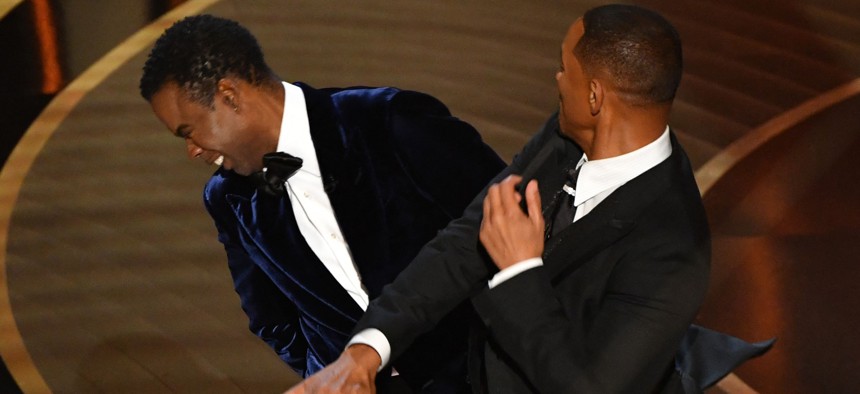Opinion
Anatomy of an apology
A restorative justice practitioner examines Will Smith’s latest message regarding the infamous "Oscar slap."

Actor Will Smith (R) slaps actor Chris Rock onstage during the 94th Oscars at the Dolby Theatre in Hollywood, California, on March 27, 2022. (Photo by Robyn Beck / AFP) (Photo by ROBYN BECK/AFP via Getty Images)
Last week, I happened upon Will Smith’s apology that he released on Instagram following the now-notorious Oscars slap. I’m interested in apologies: I’ve been working in the restorative justice movement for many years, and I am often tasked with supporting people through conflict and violence. I listen to those who have been seriously harmed as they find brave ways to express their pain, while simultaneously helping those who caused that very harm to take responsibility through both words and deeds. I meet all kinds of people who’ve caused different levels of harm, even death, and my main task is to listen as they unpack what’s happened to them and to others, and then to support them in honestly facing what they’ve done. Whenever possible, I support them in actually facing who they’ve hurt. This, to me, is accountability.
When it comes to politicians or celebrities, I don’t really understand their world. But, like many women over the last five years, I’ve been deeply disappointed by the half-baked apologies that followed the #metoo movement, most of which felt transactional or superficial, and which never really approximated accountability.
I feel differently about what Will Smith put out there, and I think some of the richness and wisdom in what he said is worth surfacing, with two caveats. First, repair is rooted in both words and deeds — so while I appreciate what he said, it needs to be followed by actions. Second, and most importantly, this didn’t happen to me, or to any of the viewers or anyone else for that matter. It happened first and foremost to Chris Rock, and to an extent, to his loved ones and community. Chris Rock’s voice matters, and one of the many awful aspects of being attacked or victimized is losing agency over your own story. I hope that he was given the chance to see the video before it was released, and that even if he didn’t want to say anything about it, that he wasn’t blind-sighted by its release.
So why did this apology strike a chord where others have fallen short? For one, Will Smith owns what he did, apologizing directly to Chris Rock without minimizing his actions or making excuses. This is a huge turnaround from when the incident first happened, when he said, “love will make you do crazy things,” triggering panic and PTSD in countless survivors of violence. This time, by contrast, he is clear-eyed about the incident. No one made him do it, and there are no excuses. “There is no part of me that thinks that was the right way to behave,” he says.
Second, he acknowledges many of the other people who were impacted — like Questlove, for starters. It’s important that he also acknowledged Chris Rock’s family, especially his mother. He takes stock of the ripple effects of the damage, and names each aspect of it. For the cynics out there, I promise you that this is an incredibly difficult task. We live in a society that demonizes anyone who commits harm, with stiff punishments and often no path for return. The result is to discourage truth-telling, with people doing whatever they can to avoid the stigma of wrongdoer. Even worse, to truly escape the clutches of our punitive mindset, many people go on the offensive and deflect blame onto the very people who were victimized, which results in a never-ending game of finger-pointing. This is the context within which Will Smith is publicly leaning into where he’s gone wrong. Full stop. To then willingly add to the list many of the indirect victims of his actions is almost without precedent.
But here’s the kicker. At one point in the video, he says, “I’m deeply remorseful, and I’m trying to be remorseful without being ashamed of myself.” This is the key. This country traffics in shame. I don’t mean the kind of shame that comes from feeling bad about something you did. I mean toxic shame, the kind of shame that tells you that you’re a bad person and that you’ll never be worth anything. When we isolate, stigmatize, and punish people, we are using toxic shame to break them down. People have long made the connection between shame and violence,[1] and have made the case that we have to start unlocking shame in order to prevent future violence.
This apology provides a powerful roadmap for taking responsibility without taking on toxic shame. To my mind, he’s wrestling with actual remorse, a powerful emotion that doesn’t try to rewrite the past, but rather integrates our most disappointing and devastating actions into the present moment, alive to the truth and consequences of what we’ve done.[2] This, to me, is the most elevated and instructive piece of the entire video.
All of us cause harm. But if we want to evolve and repair relationships, we need to face our actions with honesty, and make room for a sense of remorse that doesn’t suffocate us with shame. We’re all connected, and we impact each other for good and for bad. When we move in the wrong direction, the best of us will listen to our loving supporters and find a way to walk the path of return. This starts with a real apology.
Erika Sasson is an attorney and consultant who designs, implements, and facilitates restorative justice practices. She has worked in community-based settings and large systems, including courts and schools, and on issues ranging from intimate partner violence to homicide. She was previously the director of restorative practices at the Center for Court Innovation. This piece was originally published on Medium.
NEXT STORY: Closing the tech gap in NYC starts with expanding K-12 computing education
